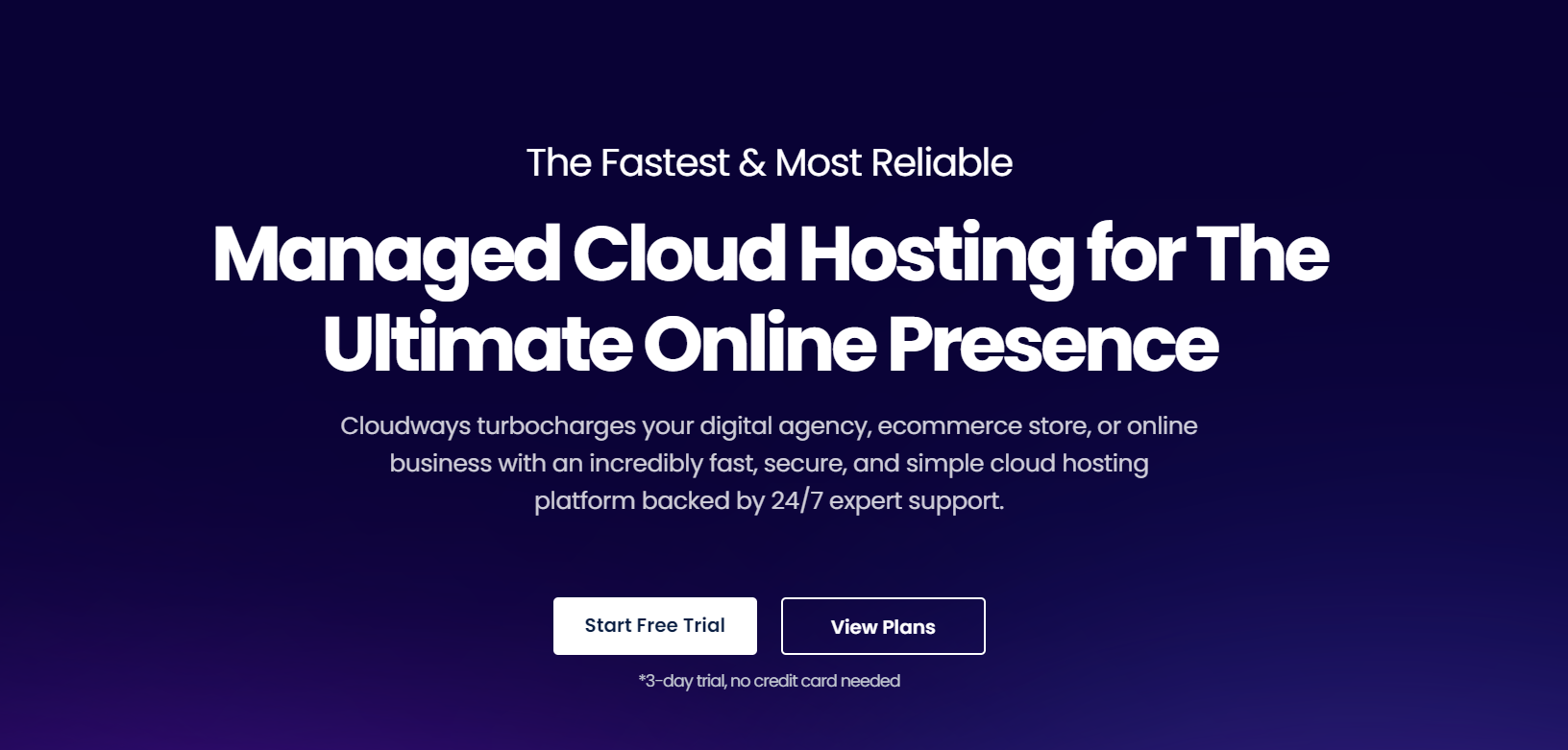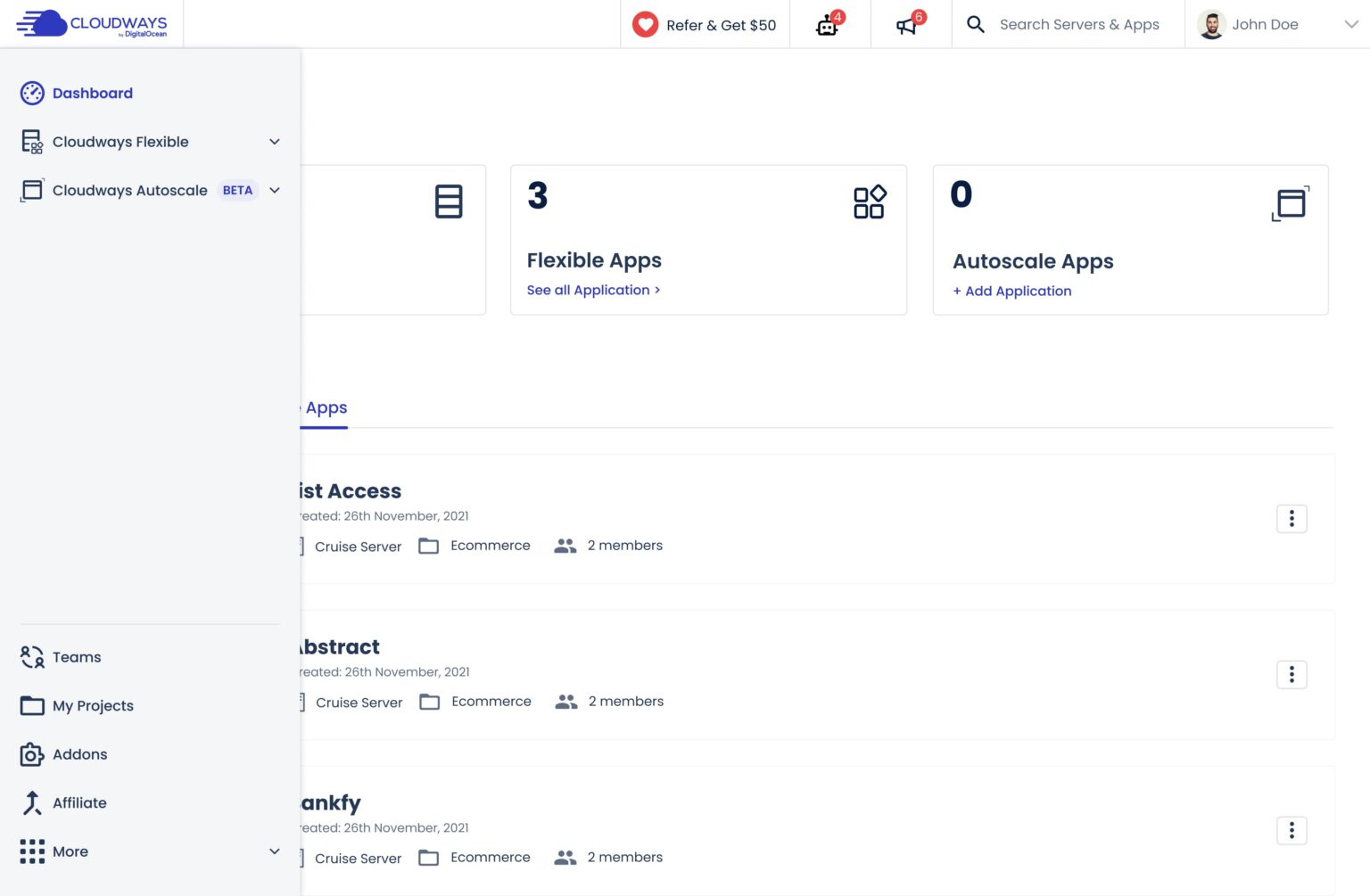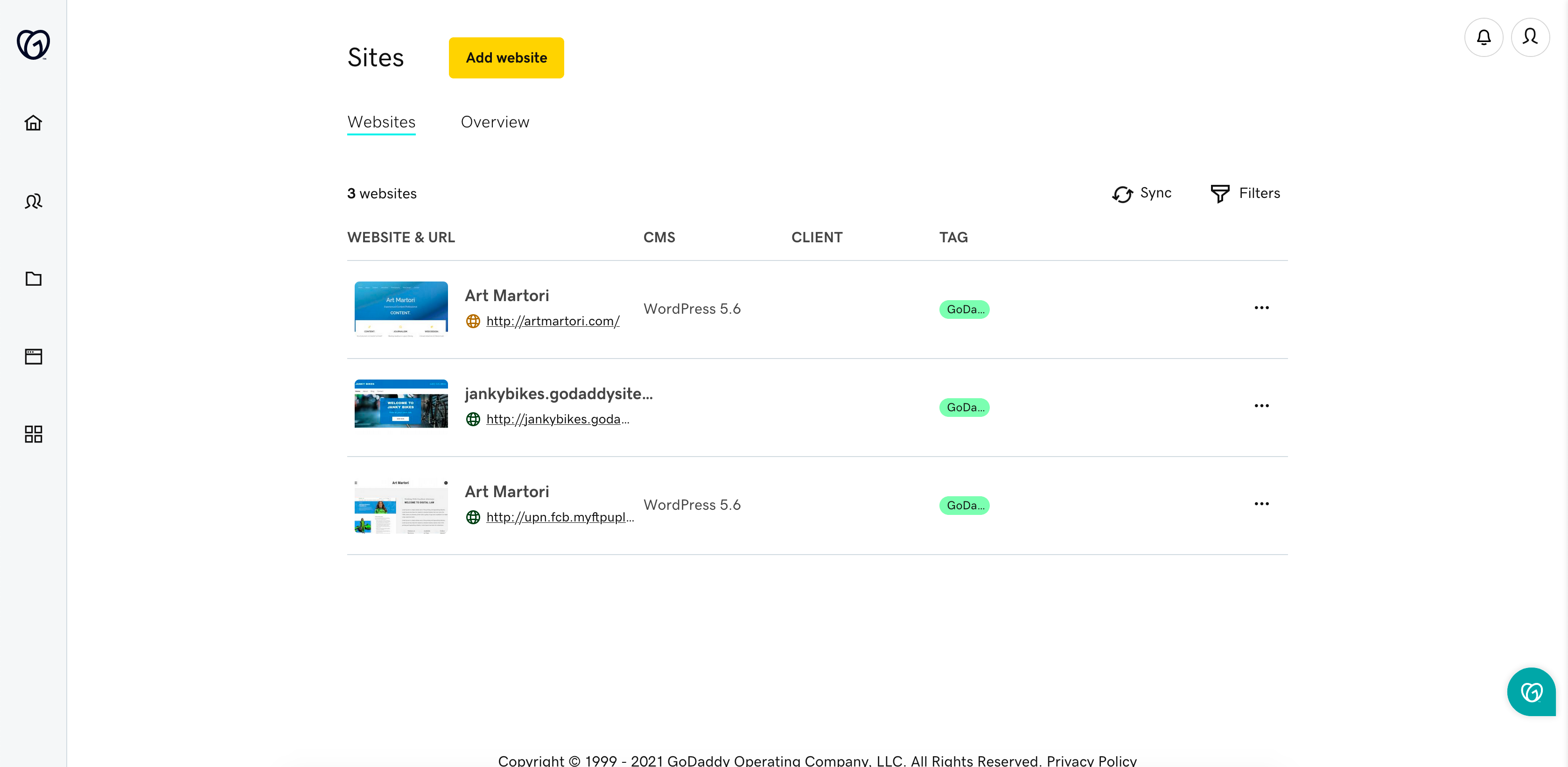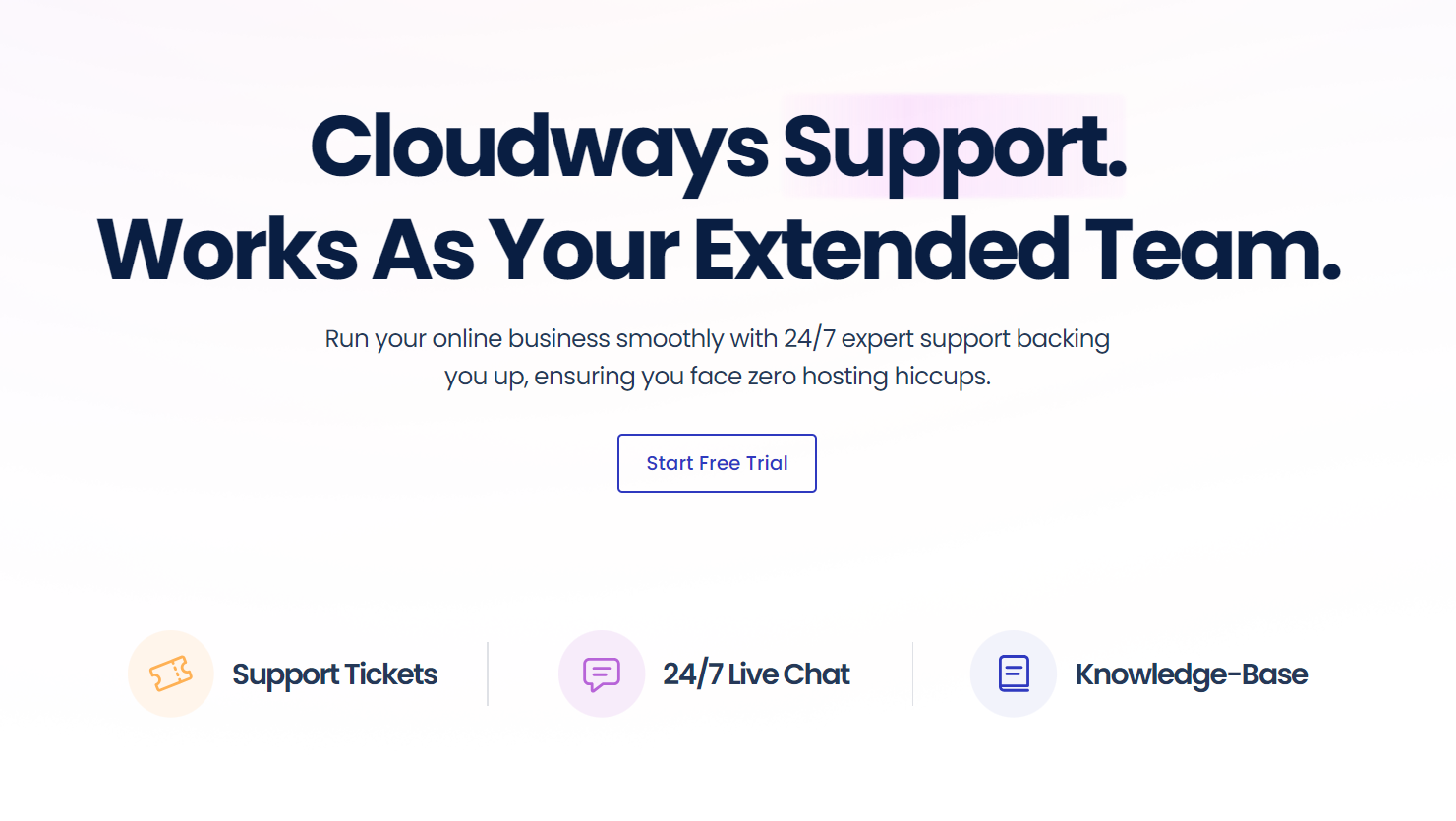Godaddy vs Cloudways: Final verdict
Looking over Cloudways vs. GoDaddy, it’s clear why both hosts are so popular. They have both hosted millions of websites that run on WordPress for decades, building up a loyal customer base.
Cloudways (Overall grade: 8.5)
prioritizes high performance and flexibility, with cloud hosting and managed services that cater to both small businesses and larger enterprises needing scalable and powerful solutions. With stellar uptime records, advanced caching technologies, and vertical scaling capabilities, Cloudways ensures minimal downtime and fast load times. However, it lacks built-in email hosting and a free domain, which may require additional setup and costs for users desiring integrated services.
GoDaddy (Overall grade: 7.8)
offers an extensive suite of hosting plans, covering a variety of needs from shared hosting to WordPress and VPS hosting. Its all-in-one approach includes free domains, email hosting, and SSL certificates, making it a convenient choice for users seeking a comprehensive hosting package. While GoDaddy provides solid performance and user-friendly tools, it may fall short in scalability and advanced performance optimization compared to Cloudways. Customer support can be a hit-or-miss, with some users praising its responsiveness and others mentioning inconsistent experiences.
 Overall grade:7.8 |
 Overall grade:8.5 |
|
|---|---|---|
| Uptime and Availability | 8.6 | 9.5 |
| Hosting Performance | 8.1 | 8.8 |
| Hosting Security | 8.6 | 8.0 |
| Price | 7.7 | 8.6 |
| Hosting Features | 7.1 | 6.9 |
| Ease Of Setup | 8.7 | 9.0 |
| User Management | 5.0 | 8.2 |
| Customer Support | 8.2 | 9.2 |
| User feedback | 3.9/5 | 4.7/5 |
Hosting types offered
Both platforms provide a variety of hosting types, each designed to meet the different needs of users.
 |
 |
|
|---|---|---|
| Shared hosting | ||
| Cloud hosting | ||
| WordPress hosting | ||
| Ecommerce hosting | ||
| VPS hosting | ||
| Dedicated hosting |
Although both offer a variety of hosting plans tailored to different needs, in
certain cases, one platform may prove to be more suitable.
and security.
ideal for ecommerce needs.
beneficial for agencies.
suitable for high-traffic sites.
Detailed comparison
Uptime and availability
Evaluates the average uptime statistics, uptime guarantee and overall availability of the hosting
provider
Score Components:
- Uptime percentage (30%): evaluates the uptime statistics in given period of time
- Uptime guarantee (20%): Assesses if the platform offers an uptime guarantee and
whether the actual uptime matches the promised guarantee. - General performance (25%): Evaluates how fast is the average response time and overall
it’s stability. - Responsiveness (10%): Adaptability to different devices and screen sizes.
- Availability (25%): Reflects the total downtime and number of outages.
 8.6
8.6
 9.5
9.5
🏆 Winner Cloudways: Superior uptime and performance make Cloudways the top choice for hosting needs.

Cloudways delivered stellar performance with a 100% uptime in 2020 and 2021, and 99.99% in 2022. This, combined with a swift average server response time of 229ms and a robust system architecture, ensures minimal service interruption. Cloudways supports multiple cloud infrastructure providers and specializes in managed cloud hosting, though it lacks domain registration and email hosting. Overall, Cloudways offers superior performance and uptime, ensuring a reliable and efficient hosting solution.

GoDaddy offers a 99.9% uptime guarantee, generally matching industry standards. During our two-month test period, GoDaddy demonstrated a commendable 99.98% uptime, surpassing its own promises. While their server response time and global load times are impressive, WordPress hosting saw frequent short downtimes, impacting reliability. Compensation for downtime is minimal and limited to service credits, which might not be very appealing.
Which one has better hosting performance?
Score Components:
- Hosting speed (30%): This includes SSD quality, Load times, PageSpeed score ranges,
additional information on website speed, built-in plugins for performance enhancement, available caching
methods, and CPU/RAM options - CDN (20%): Considers whether CDN is available or not, whether it’s free or paid, and
the quality of the CDN service - Available data centers (30%): Evaluates the number of data centers and their locations
globally. - Scalibility (20%): Looks at whether elastic scaling is available, the process required
to scale (manual upgrade vs. automatic scaling), the presence of dedicated servers, and the costs
associated with scaling.
 8.1
8.1
 8.8
8.8
🏆 Winner Cloudways: Superior performance and advanced features for dynamic websites
When it comes to general performance, Cloudways outshines GoDaddy. Cloudways’ use of SSD drives ensures three times faster performance compared to traditional HDDs, significantly reducing page load times. Coupled with built-in advanced caches like Memcached, Varnish, Nginx, and Redis, Cloudways guarantees lightning-fast load times. Cloudways also offers advanced server optimization stacks including NGINX, Apache, and PHP-FPM, enhancing performance for high-traffic sites. While GoDaddy has optimized servers and global data centers to boost speed, it lacks the advanced caching options provided by Cloudways. Additionally, Cloudways offers Cloudflare Enterprise for CDN, which more effectively shields against DDoS attacks compared to GoDaddy’s basic DDoS protection.
Website Speed
For website speed, Cloudways’ integration of SSD hosting and advanced caching technology ensures faster load times and better performance. GoDaddy offers optimized servers and a 99.9% uptime guarantee, but it can’t match the speed-enhancing solutions like Breeze plugin or Free Object Cache Pro that Cloudways provides. With PHP 8.2 ready servers and auto-healing capabilities, Cloudways maintains a higher standard of speed and reliability, making it a more attractive option for performance-centric users.
Scalability
Cloudways offers elastic vertical scaling, allowing users to easily scale server resources such as RAM, CPU, and storage as needed. This flexibility is crucial for high-availability and performance at minimal costs. Users can perform scaling automatically without upgrading plans, making it an advantageous option for growing websites. GoDaddy requires plan upgrades for scaling, offering both shared and dedicated resources across different plans. While GoDaddy does offer dedicated servers in its VPS plans, the upgrading process is manual and involves higher costs compared to Cloudways’ more seamless approach.
Which one has better security features?
and regulatory requirements
Score Components:
- Technical security measures (40%): This includes encryption, firewalls, DDoS
protection, secure configurations, server monitoring, access control and availability of security addons
(e.g Sitelock security). - Operational security measures (30%): Encompasses data privacy, backups and data
redundancy. - Compliance and certifications (20%): Adherence to legal and regulatory requirements
(e.g., GDPR, HIPAA) and possession of certifications (e.g., ISO 27001, SOC 2). - Business and reliability (10%): Factors in the provider’s reputation, uptime
guarantees, and customer support.
 8.6
8.6
 8.0
8.0
🏆 Winner GoDaddy: Known for a comprehensive suite of security features and robust technical measures.
Both GoDaddy and Cloudways, have notable differences in their approaches to technical and operational
security, as well as in their compliance with regulations.
Technical security measures:
GoDaddy offers AutoSSL, self-managed, and managed SSL services, providing flexibility in securing websites. It supports the latest PHP versions with extended long-term support for PHP 7.4 and 8.0, ensuring performance and security. Cloudways offers free Let’s Encrypt SSL certificates and supports PHP versions from 5.6 up to the latest 8.2, making it adaptable but less robust compared to GoDaddy in SSL services. Both providers offer DDoS protection and various forms of firewall security, but GoDaddy stands out with additional features like CloudLinux and Cage FS for resource balancing and content protection.
Operational security measures:
GoDaddy includes daily backups, malware scanning and removal, and round-the-clock network security. It has a Web Application Firewall (WAF), automated updates, and 24/7 customer support. Cloudways provides server-level firewalls, bot protection, auto-healing servers, and two-factor authentication. It also offers SSH and SFTP access for secure management. While both have strong operational security, GoDaddy offers more comprehensive automated update and maintenance features, including daily backups and around-the-clock support.
Compliance and certifications:
GoDaddy is fully GDPR compliant and offers PCI-certified products such as WooCommerce Hosting and the GoDaddy Online Store. Cloudways uses PCI-DSS compliant hardware from cloud providers but is not PCI-DSS compliant itself. GDPR compliance in Cloudways is implied through its security measures. GoDaddy’s comprehensive compliance measures make it better suited for businesses needing strict regulatory adherence.
 |
 |
|
|---|---|---|
SSL certificate |
AutoSSL, managed, and self-managed |
Free 1-Click SSL (Let’s Encrypt) |
Additional security features |
WAF, malware scanning and removal, daily backups |
Server firewalls, bot protection, auto-healing servers |
PHP versions |
7.4, 8.0 |
5.6, 8.0, 8.2 |
GDPR compliance |
Yes |
Not specified |
HIPAA compliance |
Not specified |
Not specified |
PCI compliance |
Yes, PCI-certified products |
Not PCI-compliant but uses compliant hardware |
Hosting features
Score Components:
- Domains (20%): Assesses the availability of a free domain, domain purchase options, and
pricing - Email (15%): Considers if the provider offers full email hosting, or is reselling
third-party service, and if the email is only transactional or not - Website builder (15%): Checks if website builder is available, and it’s user
friendliness and overall the level of customization allowed. - Staging environment (20%): Determines if a staging environment is available, allowing
for testing changes before going live. - FTP & SFTP accounts (10%): Evaluates if and how easily users can access FTP and
SFTP accounts - Git and SSH access (20%): Assess whether Git is integrated into the hosting service and
if SSH access is provided
 7.1
7.1
 6.9
6.9
🏆 Winner
GoDaddy: A versatile hosting provider with extensive features ideal for a wide range of users.
GoDaddy offers a variety of hosting plans, including web hosting, VPS hosting, and managed WordPress hosting. These plans are accompanied by a free domain, email hosting, and SSL certificates, making them attractive for individuals looking for an all-in-one solution. GoDaddy also provides a user-friendly website builder, free WordPress migration tools, and comprehensive customer support. Features such as a 30-day money-back guarantee and global data centers enhance the service’s reliability and accessibility. Notably, GoDaddy includes automatically-assigned SSL certificates for cPanel accounts, which simplifies security management for users.
Cloudways, on the other hand, focuses on performance and flexibility, offering SSD hosting, built-in caches, and an optimized stack. It supports advanced features like vertical scaling and pay-as-you-go plans. The inclusion of SSH and SFTP access, dedicated firewalls, and application isolation make Cloudways a strong candidate for those who prioritize security and performance. Cloudways also offers unique features like Cloudflare Enterprise, real-time server monitoring, and automated backups. However, it lacks some conveniences like a free domain and built-in email hosting, which could be a deciding factor for some users.
 |
 |
|
|---|---|---|
Free domain |
Yes, for the first year |
No |
Free SSL |
Yes, for the first year |
Yes |
Email hosting |
Yes |
No |
Website builder |
Yes |
No |
Staging environment |
Yes |
Yes |
FTP & SFTP accounts |
Yes |
Yes |
Git and SSH access |
No |
Yes |
Free backup |
Yes, daily backups |
Yes, automated backups |
Money back guarantee |
Yes, 30-day |
No |
a location.
As a result in rare cases the features mentioned here can differ from the ones you see on their websites.
Both providers support a range of users from beginners to experts with user-friendly website builders and WordPress staging areas. However, in terms of developer tools, both GoDaddy and Cloudways offer robust options including SSH access, support for multiple programming languages, and Git for version control, thus appealing to developers looking for advanced capabilities.
Email services:
GoDaddy offers comprehensive email hosting, allowing users to set up and manage their email campaigns directly. Transactional email capabilities are included without explicit limits, making it a versatile option for most users. Conversely, Cloudways does not provide built-in email hosting but collaborates with Rackspace Email and Elastic Email as add-ons, mainly for managing transactional emails. This may require additional setup and potentially higher costs for users needing integrated email solutions.
Price
Score Components:
- Plan value (40%): What each pricing tier offers.
- Transparency and clarity (30%): Clearness of pricing structures.
- Flexibility of plans (20%): Range of options to suit different budgets.
- Hidden costs (10%): Additional expenses not included in the plan.
 7.7
7.7
 8.6
8.6
🏆 Winner
Cloudways: Cloudways offers diverse and flexible hosting plans catering to varied needs with exceptional performance.
Evaluating the pricing of plans among various hosting providers can be complex due to their differing pricing and renewal strategies. Additionally, certain plans require annual commitments, which adds to the difficulty of making comparisons. The prices listed are based on monthly commitments; plans requiring annual commitments are indicated. Additionally, although some providers offer identical plans for WordPress and shared hosting, we have created separate tables for each to enhance clarity.
Comparing GoDaddy and Cloudways reveals distinct differences: GoDaddy offers a variety of shared, VPS, and WordPress hosting plans with introductory discounts but higher renewal rates. Cloudways focuses on flexibility, providing hourly and monthly billing options with scalable resources. GoDaddy’s shared plans include free domain and SSL for higher plans, while Cloudways provides robust cloud hosting with transparent usage-based pricing, suitable for dynamic needs.
 |
 |
|---|---|
|
Managed WordPress Basic $12.99/mo
1 website, 10 GB NVMe storage, free domain, SSL certificate, pre-installed WordPress, AI creation tool, weekly backups, web application firewall, automated malware scans & removal. Value for price:7.7
|
DO1GB $11.00/mo
1 website, 25 GB storage, 1 TB bandwidth, AI-powered support, weekly backups, automated migration, 24/7 support. Value for price:8.2
|
|
Managed WordPress Deluxe $13.99/mo
1 website, 20 GB NVMe storage, free domain, SSL certificate, pre-installed WordPress, AI creation tool, daily backups, web application firewall, automated malware scans & removal, 2x faster CDN, DDoS protection, staging site. Value for price:8.0
|
DO2GB $24.00/mo
1 website, 50 GB storage, 2 TB bandwidth, AI-powered support, weekly backups, automated migration, 24/7 support. Value for price:8.1
|
|
Managed WordPress Ultimate $15.99/mo
1 website, 30 GB NVMe storage, free domain, SSL certificate, pre-installed WordPress, AI creation tool, daily + on-demand backups, web application firewall, automated malware scans & removal, 2x faster CDN, DDoS protection, staging site, SEO optimizer, WordPress code optimizer, smart WordPress plugin manager, WooCommerce, priority support. Value for price:8.2
|
DO4GB $46.00/mo
1 website, 80 GB storage, 4 TB bandwidth, AI-powered support, weekly backups, automated migration, 24/7 support. Value for price:8.4
|
 |
 |
|---|---|
|
Web Hosting Economy $5.99/mo
1 website, 25 GB NVMe storage, 10 databases, shared RAM/vCPU, free domain for 1 year, free email, free SSL for 1 year, 30-day money-back guarantee, WordPress migration tool. Value for price:7.5
|
N/A |
|
Web Hosting Deluxe $7.99/mo
10 websites, 50 GB NVMe storage, 25 databases, shared RAM/vCPU, free domain for 1 year, free email, unlimited SSL for all sites, 30-day money-back guarantee, WordPress migration tool. Value for price:7.7
|
N/A |
|
Web Hosting Ultimate $12.99/mo
25 websites, 75 GB NVMe storage, 50 databases, shared RAM/vCPU, free domain for 1 year, free email, unlimited SSL for all sites, 30-day money-back guarantee, WordPress migration tool. Value for price:7.9
|
N/A |
|
Web Hosting Maximum $17.99/mo
50 websites, 100 GB NVMe storage, 100 databases, shared RAM/vCPU, free domain for 1 year, free email, unlimited SSL for all sites, 30-day money-back guarantee, WordPress migration tool. Value for price:8.0
|
N/A |
 |
 |
|---|---|
| N/A |
DO1GB $11.00/mo
25 GB storage, 1 TB bandwidth, 24/7 support, scalable resources. Value for price:8.5
|
|
1 vCPU/2GB RAM $8.99/mo
1 vCPU core, 2 GB RAM, 40 GB NVMe storage, snapshot backups, Linux, cPanel/Plesk available, 1 additional IP, global data centers. Value for price:7.7
|
DO2GB $24.00/mo
50 GB storage, 2 TB bandwidth, 24/7 support, scalable resources. Value for price:8.6
|
|
2 vCPU/4GB RAM $17.99/mo
2 vCPU cores, 4 GB RAM, 100 GB NVMe storage, snapshot backups, Linux/Windows, cPanel/Plesk available, 2 additional IPs, global data centers. Value for price:7.8
|
DO4GB $46.00/mo
80 GB storage, 4 TB bandwidth, 24/7 support, scalable resources. Value for price:8.5
|
|
4 vCPU/8GB RAM $34.99/mo
4 vCPU cores, 8 GB RAM, 200 GB NVMe storage, snapshot backups, Linux/Windows, cPanel/Plesk available, 3 additional IPs, global data centers. Value for price:8.0
|
DO8GB $88.00/mo
160 GB storage, 5 TB bandwidth, 24/7 support, scalable resources. Value for price:8.8
|
|
4 vCPU/16GB RAM $44.99/mo
4 vCPU cores, 16 GB RAM, 200 GB NVMe storage, snapshot backups, Linux/Windows, cPanel/Plesk available, 3 additional IPs, global data centers. Value for price:8.0
|
DO16GB $149.00/mo
320 GB storage, 6 TB bandwidth, 24/7 support, scalable resources. Value for price:8.9
|
As a result in rare cases the prices displayed here can differ from the ones you see on their websites.
Enterprise plans
GoDaddy provides comprehensive VPS hosting plans, offering up to 16 GB RAM, and 4 CPU cores with NVMe SSD storage, cPanel/Plesk options, and additional IP addresses. Cloudways excels with extensive cloud hosting options for AWS, Google Cloud, and DigitalOcean, ranging up to 384 GB RAM, powerful multi-core processors, and scalable resources, making it ideal for enterprise-level applications.
Godaddy vs Cloudways: Ease of setup
platform.
Score Components:
- Site migration (25%): Assesses whether the provider offers tools for site migration,
either automated or manual, and whether these services are free or require a fee. - Admin panel usability (35%): Evaluates the type of admin panel provided, such as the
standard cPanel or a custom solution, focusing on its accessibility and user-friendliness for both
technical and non-technical users. - Setup features (20%): Examines the availability and ease of use of various setup
features, including FTP accounts, file managers, email account setup, PHPMyAdmin, and easy CDN
configuration. - Help center quality (20%): Measures the quality and accessibility of the provider’s
help center resources, including articles and tutorials.
 8.7
8.7
 9.0
9.0
🏆 Winner
Cloudways: Offering highly accessible and versatile tools for both technical and non-technical users.
GoDaddy employs a standard cPanel for its hosting management, which is noted for its widespread use and familiarity. This makes it straightforward for seasoned users who are accustomed to traditional hosting environments. The industry-standard cPanel facilitates application installations, security management, and backups in a user-friendly manner. However, for those less experienced, the variety of options and configurations within cPanel can appear overwhelming. GoDaddy addresses this to some extent by offering detailed help articles and 24/7 support.

Cloudways, on the other hand, provides a custom, intuitive control panel tailored to simplify server and application management tasks. Its control panel is designed to be accessible to both beginners and advanced users alike, featuring streamlined 1-click actions for common tasks such as backups, server cloning, and application launching. The inclusion of pre-installed tools like Git aids in more complex deployments, making it a versatile choice for developers. Cloudways’ control panel focuses on minimizing complexity while enhancing usability, making it highly user-friendly for managing web hosting tasks.

Both GoDaddy and Cloudways offer tools for migrating websites. GoDaddy provides a free WordPress Migration Tool, which automates the process of moving an existing WordPress site to their hosting. This ensures minimal downtime and ease of use, especially for those who may not be technically inclined. Cloudways also offers a free migration service for the first website from any web host. Their approach combines automated tools and expert support, ensuring a smooth transition without additional costs. Both providers make site migration accessible, but Cloudways’ free migration service encompasses a wider range of applications beyond just WordPress.
The platforms provide extensive knowledge bases filled with guides, how-to articles, and instructional content. GoDaddy offers a wide range of resources alongside 24/7 chat and phone support. Cloudways also boasts a detailed help center with an intuitive search function and around-the-clock support via live chat, phone, and ticketing, ensuring comprehensive user support.
User management
accessibility.
Score Components:
- Role customization (40%): Flexibility in creating and defining user roles and
permissions. - Ease of management (30%): User interface and tools for managing users.
- Access control (20%): Effectiveness of access control measures for different user
levels. - Scalability (10%): Ability to manage a growing number of users efficiently.
 5.0
5.0
 8.2
8.2
🏆 Winner Cloudways: A user-friendly hosting provider offering comprehensive user management features.
When comparing GoDaddy and Cloudways, it becomes apparent that Cloudways has a significant edge in managing user roles and permissions. Cloudways provides a detailed and structured approach, allowing users to comprehensively assign roles such as Super Admin, Administrator, Editor, Author, Contributor, and Subscriber. This granularity enables precise delegation of responsibilities, catering to different levels of user engagement. Conversely, GoDaddy’s user management features are less documented and seem to lack the same depth and flexibility, potentially making it less adaptive for complex user role scenarios.
Cloudways offers a well-organized WordPress Admin Panel for user management, accessible either directly through a website URL or the Cloudways platform. The interface is intuitive, with clear sections for viewing all users, adding new ones, editing information, and managing user settings. This structured approach makes it easy for administrators to navigate various user-related tasks. GoDaddy’s user management tools are not explicitly detailed, which suggests a potentially less user-centric experience in this regard.
In terms of access control and handling a growing number of users, Cloudways stands out due to its efficient and scalable user role management system. The platform makes it straightforward to add, edit, and delete users while offering role-specific access control to ensure security and streamlined operations. GoDaddy, while popular, does not provide detailed information on these aspects, which might indicate potential shortcomings in handling extensive user management needs effectively.
Cloudways User Roles Table:
| Role | Description | Access Highlights |
|---|---|---|
| Super Admin | Full access to the entire website, including network features. | Can manage all sites, settings, and user roles. |
| Administrator | Handles all administrative tasks for the website. | Can install plugins, themes, manage settings, and user roles. |
| Editor | Can publish and manage posts, including those by other users. | Create, edit, and delete posts, manage categories and comments. |
| Author | Manages and publishes their own posts only. | Write, edit, and publish their posts, upload files. |
| Contributor | Can write and edit their posts, but cannot publish them. | Write and edit their posts, awaiting admin review. |
| Subscriber | Can manage their profile and read content. | Limited to personal profile management, no post capabilities. |
Customer support
hosting provider.
Score Components:
- Support communication channels (30%): Measures the variety of customer support types
provided (live chat, chatbot, email, phone, etc.) - Availability (20%): Assesses the availability hours for each channel, including 24/7
support options. - Technical support quality (30%): Assesses whether the provider offers comprehensive
technical support, including hardware upgrades (e.g., HDD to SSD), software installations, and web
server configuration changes. - Enterprise support (20%): Checks if there are dedicated or priority support services
for enterprise-level customers.
 8.2
8.2
 9.2
9.2
🏆 Winner
Cloudways: offering extensive support options with proactive monitoring and customizable add-ons.
 |
 |
|
|---|---|---|
Phone support |
||
Live chat support |
||
Chatbot |
||
Email/ticket support |
||
Enterprise support (dedicated agent, priority support) |

GoDaddy provides 24/7 support via phone and email, with a comprehensive knowledgebase filled with guides, online courses, and blog articles. Its live chat is exclusive to the U.S. subdomain, but it offers additional tools like free WordPress migration and automatic daily backups. Security measures such as DDoS protection and a 30-day money-back guarantee add to its service appeal.

Cloudways, on the other hand, offers 24/7/365 support through email, live chat, and an extensive online FAQ. Unlike GoDaddy, Cloudways has premium support add-ons, including phone support, a private Slack channel, and proactive monitoring. Various response times are available based on the support level, from standard to premium, allowing for scalable and tailored support solutions. Cloudways also provides additional features like a dedicated account manager with premium plans.
Godaddy vs Cloudways: User feedback
GoDaddy generally receives praise for its ease of use, affordability, comprehensive service offerings, and user-friendly interface, making it a popular choice for domain registration and basic web hosting. Many users appreciate the ability to purchase domains, web hosting, email services, and other digital products all in one place, along with frequent discounts for new customers. However, customer service experiences are inconsistent; while some users find it helpful and responsive, others report long wait times and unknowledgeable support staff. Additionally, recurring issues include high renewal costs, persistent upselling, and occasional technical difficulties.
Cloudways consistently receives high praise for its ease of use, robust performance, and excellent customer support. Many reviewers highlight the platform’s intuitive interface, effective server management features, and the ability to choose from top-tier cloud providers like AWS and DigitalOcean. Users appreciate the scalable hosting options and reliable customer service, which often includes quick response times and helpful assistance. However, some customers note areas for improvement, such as the absence of email hosting, limitations on server vendor choices, and discrepancies in pricing transparency. Overall, Cloudways is deemed a solid hosting provider, especially valued for its managed hosting features and performance enhancement capabilities.
Godaddy vs Cloudways: FAQ
Which platform is better suited for hosting WordPress websites?
Both GoDaddy and Cloudways offer optimized WordPress hosting with advanced features for speed and security. GoDaddy provides an all-in-one solution with free domains, email hosting, and SSL certificates, while Cloudways delivers superior performance with its high uptime and advanced caching technologies. The choice largely depends on whether you prioritize integrated services (GoDaddy) or high performance and flexibility (Cloudways).
Which hosting service offers better security features?
GoDaddy offers a comprehensive suite of security features including AutoSSL, malware scanning and removal, daily backups, and a Web Application Firewall (WAF). Cloudways also provides robust security with free Let’s Encrypt SSL certificates, server firewalls, bot protection, auto-healing servers, and two-factor authentication. Both platforms have strong security measures, but GoDaddy stands out with additional features like CloudLinux and Cage FS for resource balancing and content protection.
Which platform offers better customer support?
GoDaddy provides 24/7 support via phone, email, and live chat, with a comprehensive knowledgebase filled with guides and online courses. Cloudways also offers 24/7/365 support through email, live chat, and an extensive online FAQ, with premium support add-ons like phone support, a private Slack channel, and proactive monitoring. Cloudways’ premium support options and active community provide it an edge over GoDaddy.
Which hosting service offers more scalability options for growing websites?
Cloudways offers elastic vertical scaling, allowing users to easily scale server resources such as RAM, CPU, and storage without needing to upgrade plans, making it ideal for growing websites. In contrast, GoDaddy requires plan upgrades for scaling, offering both shared and dedicated resources across different plans. Cloudways’ seamless approach to scaling is generally more flexible and cost-effective.
How do the providers handle email hosting and what features are included?
GoDaddy offers comprehensive email hosting, allowing users to set up and manage their email campaigns directly. It includes email hosting in its plans, making it a versatile option for most users. Cloudways does not provide built-in email hosting but collaborates with Rackspace Email and Elastic Email as add-ons, mainly for managing transactional emails, which may require additional setup and costs.
The making of this blog
We followed a clear, step-by-step process to write and research this article.








